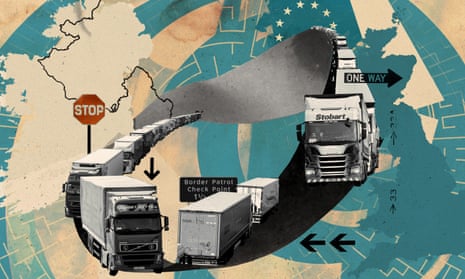The myths of a no-deal Brexit are about to collide with reality. Those myths are many, and they flourish on both sides of the great divide. For remainers, the greatest is that no deal could never happen. They look at the polls that show far more Britons oppose a crash-out from the EU than support it – 50% to 38%, according to Ipsos Mori – and they can’t quite believe that any government would defy the public will on so grave a matter.
They look at the sensible majority of MPs who have voted to thwart it and they assume that, for all the bluster from Boris Johnson and his team, when it comes to the crunch, reason will prevail. That, in the ultimate battle of the Dominics, Grieve will triumph over Cummings.
They fail to factor in the central, dispiriting fact: that while no-dealers are united in parliament, the resistance is hopelessly divided. Labour, the Liberal Democrats, the SNP and assorted Tory rebels agree that no deal is a disaster, but they cannot settle on a common strategy to stop it. Labour has said it will not countenance joining the other parties in an emergency administration formed for the sole purpose of avoiding the calamity of no deal, even though such a rare, extreme measure is probably what it will take. The result: Johnson will be allowed to commit his act of national arson, because the opposition couldn’t agree on a hose.
Similarly, remainers retain a touching, quaint faith in the power of conventions and norms, even when faced with a Johnson-Cummings duo who proved in the 2016 referendum their willingness to trample on every custom, and break every restraint, if it serves their interests. Opponents of no deal reckon defeating Johnson in a vote of noconfidence should stay his hand. But that fails to factor in the shamelessness that could see the prime minister cling on to power long enough to schedule an election for after Britain has crashed out of the EU. Jeremy Corbyn’s letter to the cabinet secretary , pleading for him to rule out such a move, relies on an old-world trust in an unwritten constitution that the Brexiters have shown they are all too happy to trash.
Above all, remainers hold tightly to the prospect that no deal will be an instant disaster, a catastrophe that strikes the moment the clock chimes midnight. This ignores the unilateral measures the EU has already put in place to ensure that planes land and financial services don’t collapse. Even those already infamous queues of trucks at Dover may not materialise – not because everything will be fine, but because drivers decide to stay away. “The economic disruption will still be there,” says Sam Lowe, trade analyst at the Centre for European Reform. “It just might not be visible.” If pro-Europeans don’t want hardcore Brexiters claiming vindication when the sky fails to fall in on 1 November, they need to manage expectations now, bracing the public not for an explosion but a slow puncture.
Still, the greatest myths lie on the other side. One is the fond hope that Britons will weather the disruption of a no-deal Brexit as stoically as they withstood the blitz. The sight of British holidaymakers driven to tears over flight delays this week, with its echo of that time Britons called 999 to complain about KFC running out of chicken, should disabuse us of that particular daydream.
But it’s a different fantasy that surely explains much of that 38% support for no deal. Put simply, it’s the notion that crashing out of the EU on 31 October will mark a clean break and end the Brexit saga once and for all. You hear versions of this sentiment from voters and politicians, on the left as well as the right, expressed both as sheer fatigue at the whole sorry business and the desire to get on with other things. The assumption is that, if we just hold our nose and jump on Halloween, then we shall return at last to the sort of issues that dominated pre-2016 politics: the NHS, crime, education and austerity. The trouble is, that too is a fantasy.
Listen to the Irish prime minister, Leo Varadkar, who earlier this week cautioned those who were “weary of Brexit” that, “This doesn’t end on 31 October.” There might be an instant sense of catharsis, even elation, among leavers on that day, but very soon reality will reassert itself. As Varadkar put it: “If there is no deal, then at a certain point we will have to begin negotiations again.”
Doubtless, the hardest of hard Brexiters would dispute that, imagining we could turn our backs on both Ireland and the EU. But there is not a developed country on Earth that hasn’t negotiated some form of preferential trading relationship with its nearest neighbour, especially when the neighbour in question is as comparatively large as the EU is to Britain. So we will be back around that Brussels negotiating table, and the Irish prime minister was right about the first three items on the agenda when we get there. Yep, our old friends: the financial settlement, EU citizens’ rights, and the border between Northern Ireland and the Republic.
That’s right, after a no-deal Brexit, we’d be back where we started. The last three years would come to seem like an argument between a husband and wife that’s raged in the kitchen. After 31 October, as my colleague Rafael Behr likes to put it, it’d be the same argument – except now the husband would be standing on the street, the front door slammed in his face, shouting his demands through the letterbox.
EU leaders think that will happen quickly, a desperate Britain seeking talks within a few weeks of crashing out. They may be wrong. The UK government could look westward in an attempt to seal a trade deal with the US, hoping to grab a trophy that might console us for the losses incurred by Brexit. That could happen fast, if we’re willing to sign here, here and here – making the NHS vulnerable to the pressures of big pharma and opening our supermarkets to chlorinated chicken. Donald Trump may give us that kind of deal. But even that won’t work. Because trade treaties have to be ratified by the US Congress, and the Democrats who control the House have already said they won’t endorse any deal that threatens the Good Friday agreement in Northern Ireland. So guess what: we’re back at the backstop.
This is why Lowe is adamant: “Brexit doesn’t end. It just repeats itself.” This is a never-ending story. It’s why journalists working today realise they will be covering Brexit until their last breath. The contours of the argument might change after a no-deal exit – how bad is it, who’s to blame, should we rejoin the EU? – but the sides will be much as they are today. Unless we call the whole thing off, this is our future: leave v remain, remain v leave, Brexit for ever and ever.

